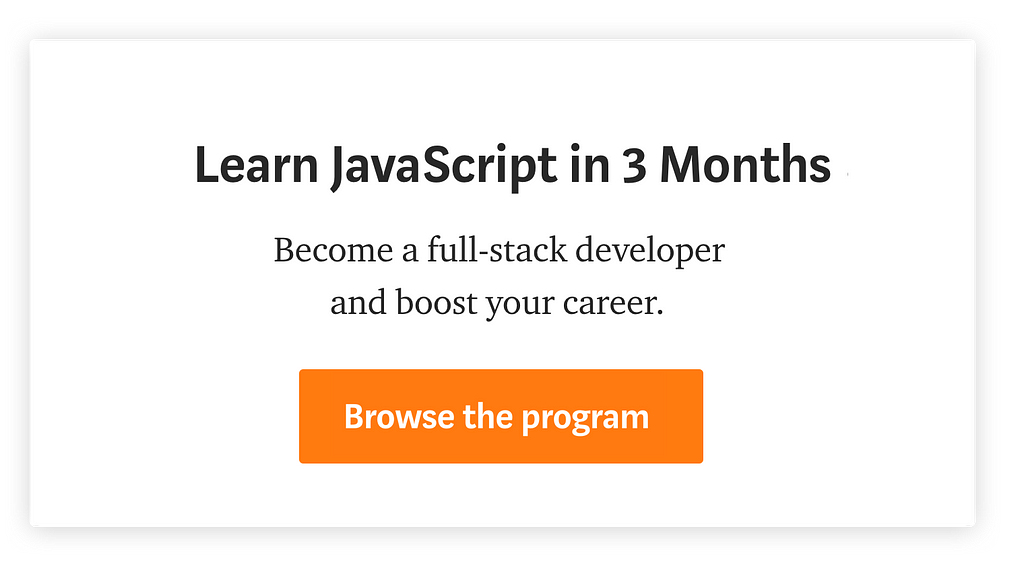Latest news about Bitcoin and all cryptocurrencies. Your daily crypto news habit.
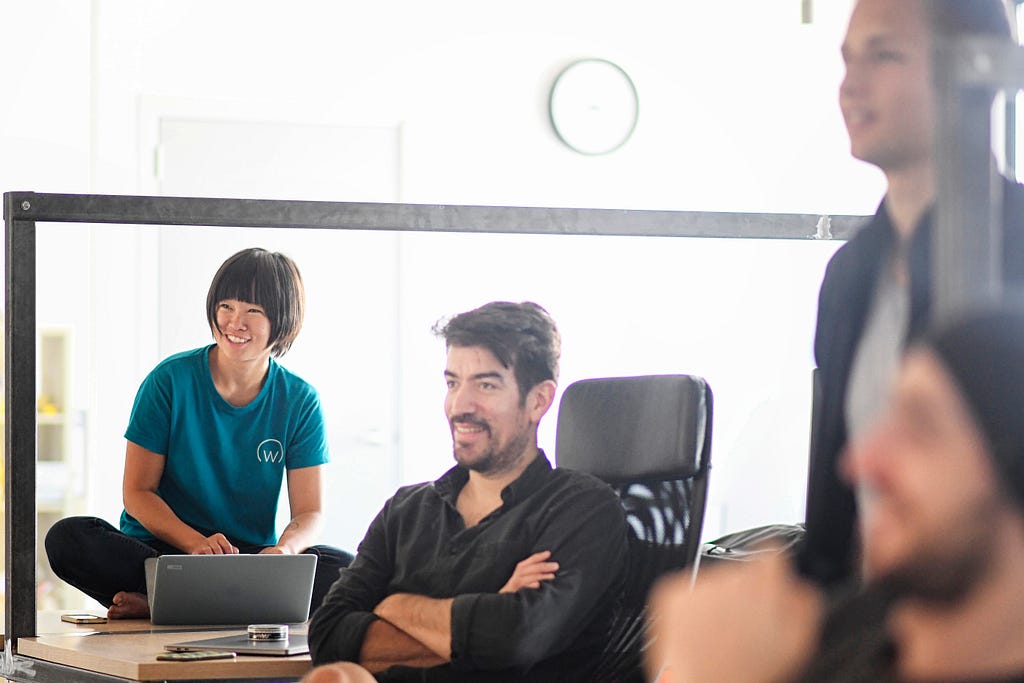 Sitting on tables. Challenging the status quo one day at a time. ©Codeworks
Sitting on tables. Challenging the status quo one day at a time. ©CodeworksEinstein once said: ‘ The measure of intelligence is the ability to change.’
Coding is partly about changing the way you think, so let’s start now. Let’s question how we think about coding bootcamps.
#Myth 1: You need to be a Maths or Science expert.
For lots of people, coding seems to come with a misconception that you need incredible knowledge of Maths or Science. In fact, to get a job you need high technical abilities. Those can be learned whatever your background. No higher maths required. If you’re not sure that your skills or background will fit, we’ll help you find out. Codeworks’ rigorous application process involves a tech interview, coding assignment and pre-course. And that’s all before you’ve set foot on our Poblenou campus.
These three challenges will help you understand what exactly lies ahead of you on a course. Maths might help with these assignments, but it’s not essential. Same for Science. Oh and Computer Science. It won’t hurt to have this knowledge, but you don’t strictly need it.
Think of coders and you might imagine geeks working on hard stuff that us simpletons could never comprehend. Mind-bending algebra problems that only a genius could solve. We get flashbacks to school and that feeling when your classmates miraculously ‘got it’ and perhaps you didn’t. Perhaps you just saw numbers swirling in a vortex of doom. Well, coding is the opposite. No vortex of doom. Instead we offer a lot of intense learning and a little blue sky.
 A background in Ping Pong always helps. © Codeworks
A background in Ping Pong always helps. © Codeworks
From project managers to those working in finance, arts and the creative fields, our students come from a huge range of backgrounds. Lucy for example, joined Codeworks after teaching English in Hong Kong.
 Lucy switched from teaching in Hong Kong to coding and loved it. © Codeworks
Lucy switched from teaching in Hong Kong to coding and loved it. © Codeworks
Our graduate George also helps to debunk this myth. George worked as a Project Manager in a marketing company before making the switch to Codeworks. He says: ‘I always thought you had a be a certain type of person who was great at maths and was a wizard with a computer. However, I can firmly say you don’t need to be Rain Man or the next Steve Wozniak to become a developer — all you need is discipline’.
We agree. A pinch of discipline and a big dollop of that problem-solving mindset is more important. In fact, you could have nothing but a a degree in Bagpiping and still successfully pass our pre-course.
#Myth 2: They’re too expensive
When investing in your own learning, the old saying is true, you get what you pay for. Our handy table here shows clearly how far your teaching hours go in comparison to other bootcamps.
Here’s a few more reasons it’s not as expensive as you think.
You’re likely to get a nice salary
Soon after you graduate, you’re likely to have your first developer job. Salaries obviously vary hugely depending on sector and company size. But even on a developer starting salary, the Return on Investment (ROI) is fast and secure. You’re able to safely pay back the tuition fees with the pay cheque you’re likely to earn afterwards.
Cost per hour of learning is super low
Have a think about how many hours of learning you need. Our course costs € 10,30 an hour for approximately 952 hours of learning. Compared to the tuition fees for relatively fewer hours of learning per week, on a longer course, we think it’s worth it.
You can deal with the opportunity cost
Consider the opportunity cost of spending three months at bootcamp vs. three years at University, with all the outgoings and loss of earnings that that entails. Considered in this way, bootcamp is much cheaper. As bootcamps are shorter than a degree, your total outgoings won’t be as high and you’ll be earning sooner.
Barcelona is sunny and cheap
Finally, the fact that you’re learning in sunny Barcelona means the cost of living is lower. Renting a central, nice room in a shared apartment in Barcelona costs around €400–500 per month. Renting the equivalent in London costs on average £ 750 a month. Considering your free healthy breakfast and the beautiful beach on your doorstep, your quality of living is better here too.
 We provide a fresh healthy breakfast every day. Eating on the outside terrace is optional! © Codeworks
We provide a fresh healthy breakfast every day. Eating on the outside terrace is optional! © Codeworks
#Myth 3: You could teach yourself the same stuff remotely
When our Codeworks co-founder Alex started to learn coding, he tried to go solo for a couple months. He taught himself wherever and whenever he had a chair and a laptop. He says:
“It ended up as just me and the monitor and I knew it wouldn’t work. After a certain point, you hit some walls. We’re born to interact. We’re social beings.”
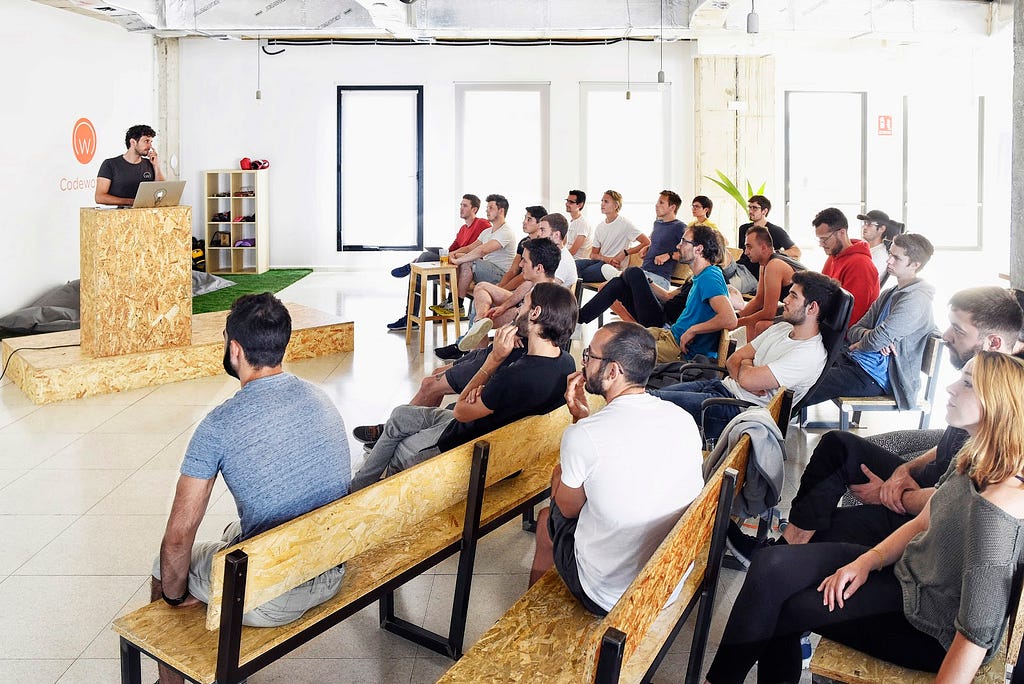
To successfully join Codeworks, you need to be familiar with coding fundamentals, and have a basic knowledge of JavaScript, HTML and CSS. If you’re not yet familiar with the fundamentals, we’ll provide you with the materials to get there. Yes, you could try to learn this theory by yourself, just as Alex did, but it would only get you so far.
Immersing yourself fully in the Codeworks campus is proven to be a more effective approach. Like learning a language, you need to surround yourself in what you’re learning. You’ll need that original ‘teach yourself’ mentality, but it’s crucial to build on that prior learning with others.
 A little daily interaction is good for the mind! © Codeworks
A little daily interaction is good for the mind! © Codeworks
Without great support, people normally get stuck along the way and lose motivation, eventually giving up. That’s why our retention rate is high. If you get stuck a team of instructors are on hand to help you. You’re never alone on campus! We even have dogs hanging around to boost your motivation.
What’s more, working remotely wouldn’t include the important extras a bootcamp offers, like pitching ideas, presenting in front of a group and interviews with potential employers during our Hiring Day.
So there you have it. Immersion works.
#Myth 4: Bootcamp won’t give you a job
This is a funny one. It’s not a myth, it’s true. No bootcamp will give you a job on a plate.
Let’s break it down. ‘Bootcamp’ is a broad umbrella term. Dig a little deeper and the more immersive bootcamps should have rigorous data available. Investigate how they measure their hiring rate. Do they count internships in that rate?
Some bootcamp programs are light, others are more advanced and so cost more money. Some will get you up and running, coding your first website. Others will direct you to a more professional outcome. Codeworks is one of those. Whether it’s for your startup, or to join an existing team, we’ll get you ready. 100% of our recent graduates who looked for work after finishing the course, are now in work. That figure includes Hannah who says:
“I wanted to learn the front–end and the back–end, to get a career in tech.”
And that’s just what she did. After graduating, Hannah got a job as a Full-Stack Engineer at rapidly growing, Barcelona based Glovo.
 Hannah wanted a career in tech, and like the rest of our cohort, she got one. © Codeworks
Hannah wanted a career in tech, and like the rest of our cohort, she got one. © Codeworks
We at Codeworks only count real coding jobs like Hannah’s when we calculate our hiring rate. Product management, marketing and design don’t count as successes in our statistics. Our rate is measured as the percentage of students who receive a job offer within six months of graduation from Codeworks, as long as they can legally work in the EU and are actively looking for employment. After this time, if one of our students doesn’t receive a job offer, we count it as a failure.
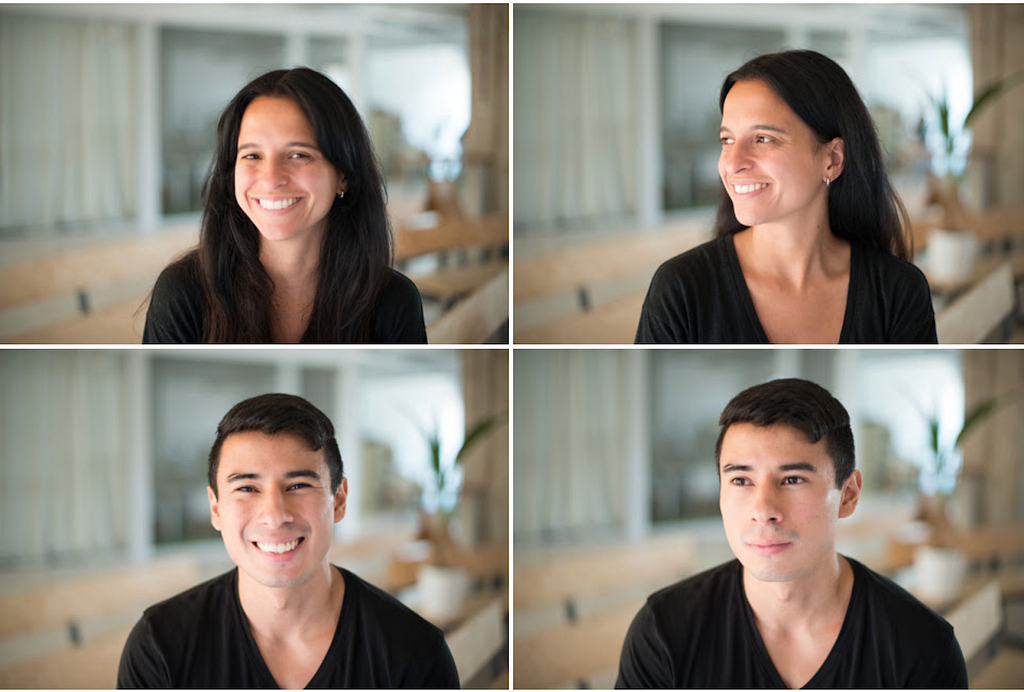
Basically, we take outcomes seriously. We have the highest standard in the industry: many institutions don’t specify how they calculate their graduates’ hiring rate, and their stats include jobs that are not related to coding. Codeworks is completely transparent about this.
We won’t give you a role on a plate. We’ll give you all the ingredients to cook up a job for yourself. Those ingredients include interview tips, professional CV management and networking opportunities. Most of all they include the skills built over the three month course that enable you to win your first offer.
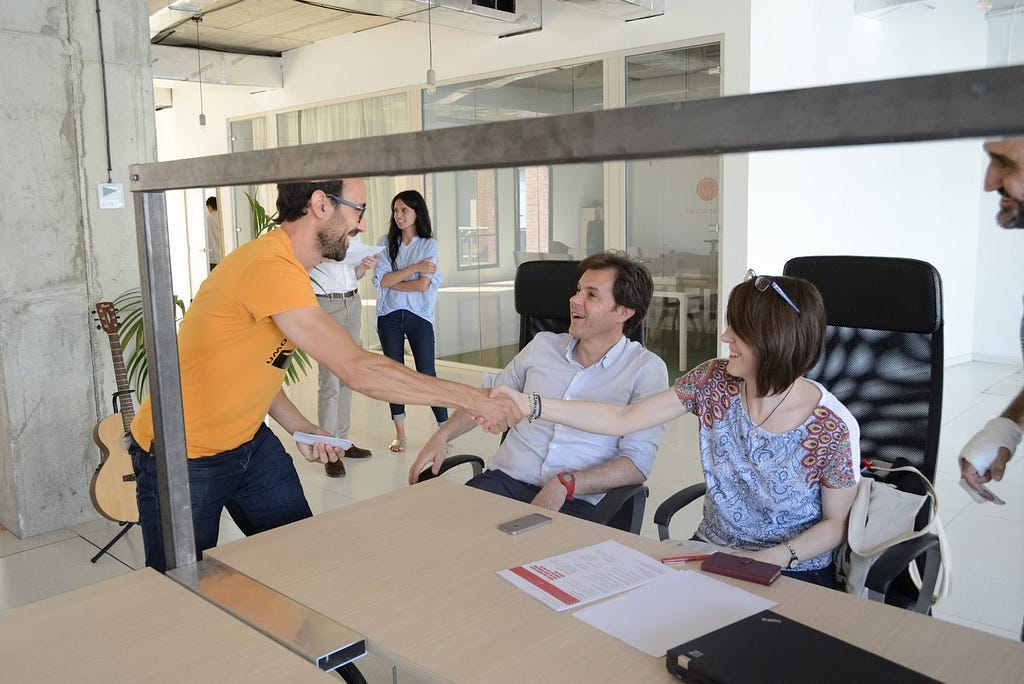
You’ll need to put some effort in too of course. We encourage students to put aside plenty of time towards the end of the course to send out batches of tailor made applications. The tech sector is thriving with job opportunities and we select our students well. If this is you, we’ll train you in best possible way, and get you in touch with top companies that are looking to expand their teams. If you’re interested in finding out more about jobs after bootcamp, get in touch.
#Myth 5: Bootcamps don’t give you the certificate you need.
Codeworks is proudly unaccredited. We don’t give you a certificate for one simple reason, you don’t need one. That’s why most coding bootcamps don’t pursue accreditation for their courses, like a traditional College or University might.
Your future employers actually don’t want a certificate, so they won’t be asking you for one. Instead, for most jobs, you’ll take a technical test, using much of what you’ve learnt on the program. In this test employers will want to see your solution to a problem. They’ll know that problem inside out. They’ll know the places you might trip up, and how your solution would work long term. It’s down to you to find the solution.
 You’ll need to simply knuckle down and breeze through the hiring process. © Codeworks
You’ll need to simply knuckle down and breeze through the hiring process. © Codeworks
So shift your mindset a little and remember you’re learning dynamic new skills rather than gaining a piece of paper. Going into interviews for your post bootcamp developer position will be a purely test-driven, rather than qualification-driven experience. We could happily give you a certificate, but without being able to apply your skills in a test or in a team, it could be a little tokenistic.
As graduate Cameron adds,
“Once you’ve graduated, don’t worry too much about not having that pure computer science theory in place because it’s rarely asked of you. I would suggest having your finger on the pulse for the techniques, patterns and best practice from leaders in the field.”
 Graduate Cameron enjoys writing well-organised, clean code in his new job. © Codeworks
Graduate Cameron enjoys writing well-organised, clean code in his new job. © Codeworks
After graduating, Cameron got a job as a Software Engineer at Fiit. Above all, companies are looking for candidates like him, with an ability to learn quickly. They’ll see if you’re a good culture fit and have the right attitude. They’ll test your technical prowess. Don’t worry, you’re not always expected to be an expert in a specific code or programme. You should have a solid foundation in programming fundamentals, but you might not be tested on this theory. We’re confident that after bootcamp, you’ll learn whatever tech stack the company uses. You’ll pick it up with your new ability to learn fast and solve the problem at hand.
Whatever your doubts about coding bootcamps, keep an open mind.
Have a look at the evidence and ask your potential bootcamps for missing information, they should provide it. There are all sorts of ways to learn coding. We’ve dispelled a few myths here, but that’s not to suggest Codeworks is for everyone. Everyone has a different way of learning and our method is unique.
Ask yourself what do I want from this experience? What do I want to build? When do I want to start working? If you’re up for three months of intense learning and a job at the end of it, think about Codeworks.
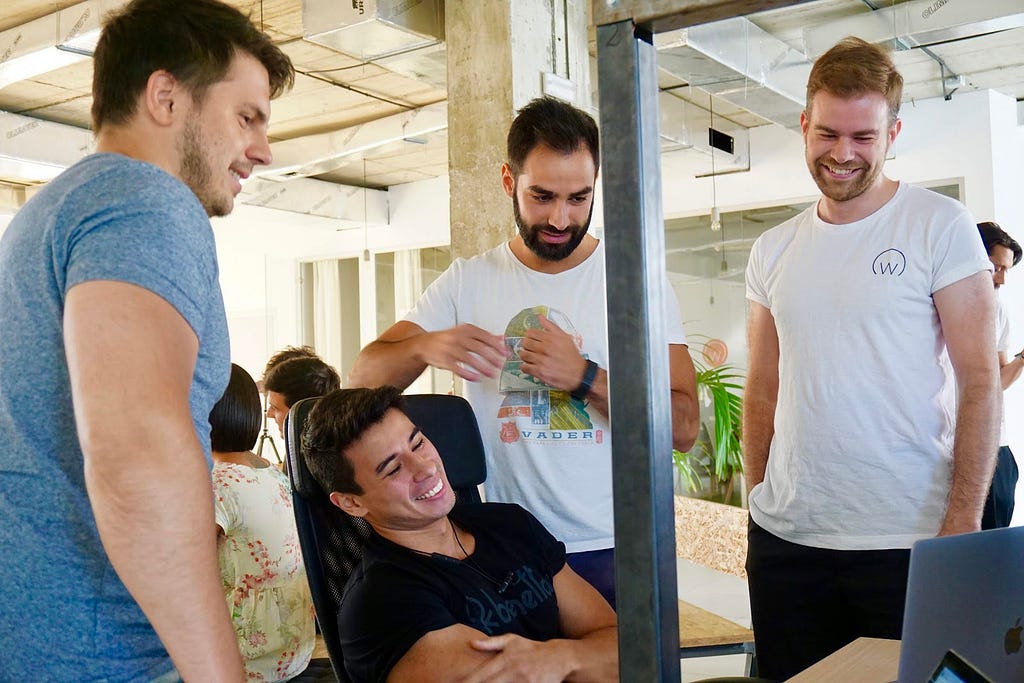
Do your research, trusts your instincts. If you’re still interested in coding bootcamps, browse the program and talk to us, we’re happy to help.
5 Common Coding Bootcamp Myths Busted was originally published in Hacker Noon on Medium, where people are continuing the conversation by highlighting and responding to this story.
Disclaimer
The views and opinions expressed in this article are solely those of the authors and do not reflect the views of Bitcoin Insider. Every investment and trading move involves risk - this is especially true for cryptocurrencies given their volatility. We strongly advise our readers to conduct their own research when making a decision.
